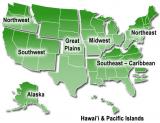Implications of Climate Change
There are many resources available that describe the implications of climate change. Some present information on historically observed changes (e.g., temperature, precipitation) while others project changes into the future based on alternative scenarios (e.g. frequency of intense storms in the future). U.S. National Climate Assessment synthesizes the best available scientific information.
This resource center focuses on helping communities adapt to the changes as documented in the U.S. National Climate Assessment (2018). The ARC-X has a particular focus on climate impacts related to EPA's statutory responsibilities, as the Agency works to fulfill its mission of protecting human health and the environment.
For those interested in learning more about the implications of climate change, links to resources are provided below.
- Climate Impacts and the EPA – Explore links to view brief descriptions of climate change impacts organized around EPA's programmatic roles and responsibilities.
- Regional Climate Impacts – Explore links to view climate impacts at the regional level, including examples of community adaptation.
- State Climate Impacts – Explore links to view climate impacts at the state level.
- U.S. National Climate Assessment (NCA) – Explore the most recent NCA.
Climate Impacts and the EPA
EPA's work on climate change adaptation is limited in scope by our statutes. Visit the links below to see how climate change can affect its programmatic responsibilities.
Air Quality
- Indoor Air Quality and Climate Change Adaptation – Climate change can increase the growth of indoor fungi and mold.
- Outdoor Air Quality and Climate Change Adaptation – Climate change can increase ground-level ozone and particulate matter.
Water Management
- Water Management and Climate Change Adaptation – Climate change can negatively impact water utility operations, water quality, and ecosystem protection efforts.
- Water Utility Operations and Climate Change Adaptation – Climate change can complicate water utility operations through more frequent and intense drought events and storms, more rapid sea-level rise, salt water intrusion, and impacts on source water quality.
- Water Quality and Climate Change Adaptation – Climate changes, including more frequent and intense droughts and storms, threaten to affect water quality in rivers, lakes, and streams.
- Ecosystem Protection and Climate Change Adaptation – Climate change can threaten ecosystem protection efforts.
Waste Management & Emergency Response
- Waste Management & Emergency Response – Climate Change Adaption – Contaminated site management and emergency response efforts will be complicated by climate change.
- Contaminated Site Management and Climate Change Adaption – The management of hazardous and non-hazardous wastes will become more difficult due to flooding and drought.
- Disaster Debris Management and Climate Change Adaption – To ensure state, tribal, local and regional resources are not overwhelmed, clean-up efforts require advanced planning and coordination among individuals at levels of government and the private sector with expertise in waste management.
Public Health
- Public Health and Climate Change Adaptation – Climate change affects public health.
- Air Quality and Health – Climate Change Adaptation – Climate change impairs EPA's efforts to attain and maintain safe outdoor and indoor air quality.
- Water Quality and Health – Climate Change Adaptation – An increase in average temperature and the increase in the frequency and intensity of storms, can affect drinking and recreational water quality.
- Chemical Exposure and Health – Climate Change Adaptation – More frequent and intense storms can increase the likelihood of flooding, causing chemicals held in underground storage tanks, landfills, and storm debris to leak or spread to previously unsoiled areas. Melting of permafrost in Alaska can also cause chemical releases.
- Extreme Heat and Health – Climate Adaptation – Climate change is expected to increase the frequency, duration, and intensity of heat waves, affecting public health.
Regional Climate Impacts
Explore the links below to learn more about the regional implications of climate change.
- Regional Impacts – See the most recent summary of climate impacts by the National Climate Assessment (NCA).
- Sector Impacts by Region – See a brief summary of the impacts of climate change on key sectors by NCA region.
- Adapting to Climate Change – See examples of how communities are adapting to climate change by NCA region.
| Regional Impacts | Sector Impacts by Region | Adapting to Climate Change |
|---|---|---|
| Northeast | Northeast | Northeast |
| Southeast & Caribbean | Southeast | Southeast & Caribbean |
| Midwest | Midwest | Midwest |
| Great Plains | Great Plains | Great Plains |
| Southwest | Southwest | Southwest |
| Northwest | Northwest | Northwest |
| Hawai'i & Pacific Islands | *U.S. Tropical Islands | Hawai'i & Pacific Islands |
| Alaska | Alaska | Alaska |
| Coasts |
*Hawai'i & Island Territories
State Climate Impacts
EPA has developed state-level summaries of climate change impacts. To learn more about the likely impacts where you live, follow the link below.
What Climate Change Means for Your State
U.S. National Climate Assessment NCA
Since 1990, the U.S. Global Change Research Program (USGCRP) has helped the Nation to understand, assess, predict, and respond to human-induced and natural processes of global change. USGCRP issued its fourth, and most recent National Climate Assessment (NCA4) in 2018. The NCA serves as the foundation of the scientific information reflected in the Adaptation Resource Center.

